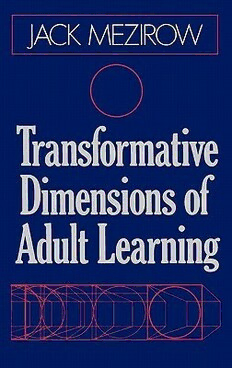Table Of Content2
Dimensions of Adult Learning
3
4
5
6
7
Adult and Continuing Education
Alan B. Knox
University of Wisconsin, Madison
8
Preface
The Author
1. Making Meaning: The Dynamics of Learning
2. Meaning Perspectives: How We Understand Experience
3. Intentional Learning: A Process of Problem Solving
4. Making Meaning Through Reflection
5. Distorted Assumptions: Uncovering Errors in Learning
6. Perspective Transformation: How Learning Leads to Change
7. Fostering Transformative Adult Learning
References
Index
9
A disturbing fault line separates theories of adult learning from the practice of those who try
to help adults learn. Psychologists interested in adult learning often find themselves trapped within the
framework of particular theories and paradigms, such as the behaviorist or psychoanalytic; they seldom
communicate with each other, let alone with educators. Philosophers, linguists, sociologists, and political
scientists also have legitimate interests in adult learning, but each group has a different frame of reference and
a different vocabulary for interpreting the phenomenon. Few efforts have been made to develop a synthesis of
the different theories that educators of adults can use.
As a result, adult educators -instructors, counselors, trainers, tutors, social workers, and others -have
had to fly by the seat of their pants. Those unfamiliar with the literature of adult education tend to use the
approaches that they themselves have experienced in universities or public schools - practices that are often
dysfunctional with adults and are incompatible with the prevailing consensus among writers in the field of
adult education. These writers share a professional orientation, a "theory-inpractice," based upon common
experience. However, that experience has often been predicated upon behaviorist assumptions simply because
the behaviorist approach has so many features amenable to bureaucratic control, such as accountability,
measurability, and focus on anticipated behavioral outcomes. Other adult educators may attempt to embrace
the appealing but fuzzy and sometimes contradictory assumptions of humanist psychology. Neither of these
sets of assumptions provides a sound basis that can help adult educators work toward the broad social and
political goals envisioned by many of the leaders in the field.
A missing dimension in these psychological theories is meaning-how it is construed, validated, and
reformulatedand the social conditions that influence the ways in which adults make meaning of their
experience. There is need for a learning theory that can explain how adult learners make sense or meaning of
their experiences, the nature of the structures that influence the way they construe experience, the dynamics
involved in modifying meanings, and the way the structures of meaning themselves undergo changes when
learners find them to be dysfunctional. These understandings must be explained in the context of adult
development and social goals. A learning theory centered on meaning, addressed to educators of adults, could
provide a firm foundation for a philosophy of adult education from which appropriate practices of goal setting,
needs assessment, program development, instruction, and research could be derived. Transformative
Dimensions of Adult Learning attempts to provide such a theory and explain its relevance to adult education.
The Bases of Transformation Theory
George Kelly (1963, pp. 10-12) observed that since the same event may be construed simultaneously
by people from various disciplines and we have no universal system of constructs, each of our constructs or
theories has its own limited "range of convenience." What is reasonably true within a limited range of
experience is not necessarily as true outside it. Scholars in different disciplines view the same concepts from
different perspectives and employ different vocabularies in articulating them. Transformation theory, as
presented here, is constrained not only by my personal limitations but also by the fact that it has been
formulated by an adult educator for other adult educators.
Transformation theory seeks to elucidate universal con ditions and rules that are implicit in linguistic
competence or human development. Specifically, it seeks to explain the way adult learning is structured and to
determine by what processes the frames of reference through which we view and interpret our experience
(meaning perspectives) are changed or transformed. In this reconstructive approach it follows Chomsky,
Piaget, Kohlberg, and most other psychologists who theorize about adult development; sociologists such as
Habermas, who theorizes about the social and linguistic conditions required for communicative action; and
philosophers such as Bateson and Cell, who directly address learning theory.
My approach to transformation theory, as elaborated in this book, has as its current context the
insurgence of constructivism, critical theory, and deconstructivism in social theory and in all of the social
sciences, law, literature, and art. Transformation theory also grows out of the cognitive revolution in
10

